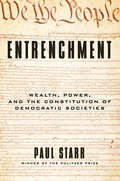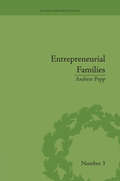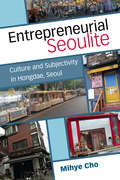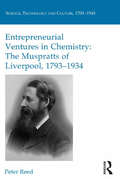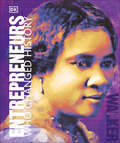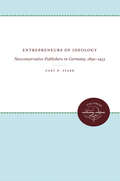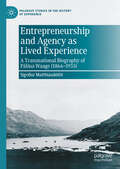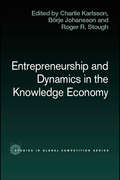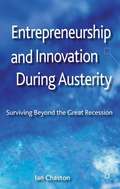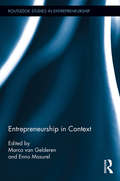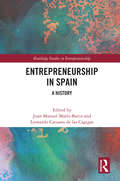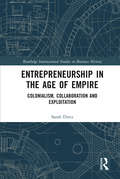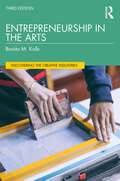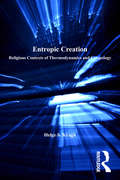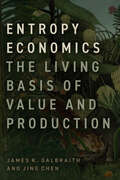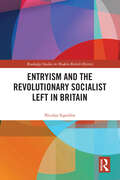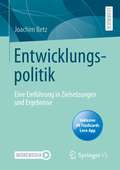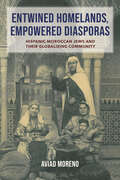- Table View
- List View
Entre un sol y una luna
by Viktoria YocarriUna apasionante historia de amor, de tumultos y conspiraciones... En 1546, al norte del Virreinato de la Nueva España, donde las tierras rojas yacen inundadas de plata y hermosa cantera rosada, se tejen los entresijos de tumultos, alzamientos y rebeliones violentas. Los principales caudillos de la conquista buscan dominar y enriquecerse, por más que para ello sea preciso sembrar cadáveres en suelo conquistado. Obligada por la fuerza de las circunstancias, Leonor Cortés Moctezuma, indígena noble por parte de su madre y española por parte de su padre, decide probar suerte en tierras novogalaicas. Cediendo a un impulso, se instala en el corazón de un valle, con sus arrugas y accidentes centrales. Poco a poco ese contrafuerte montañoso y sus gentes, que le resultan tan ajenos, se adueñan de ella. En medio de tales pormenores, conoce a Juan de Tolosa, un soldado inquieto, de carácter aventurero y andariego, que busca fortuna en las vetas de plata camino a territorio zacateco. Y se ve inmersa en una comprometida expedición, que la abandona en la disyuntiva de luchar por el destino de un amor y dejarlo todo.
Entregue ao Meu Espião
by Beatriz Garcia Dawn BrowerUm patife, um marquês, um espião... Essas eram partes integrantes da vida de Dominic Rossington, e ele as fazia muito bem. O amor o tira de rumo, e ele fará tudo em seu poder para proteger a única que tem seu coração, Lady Rosanna. O perigo os cerca, e ele terá que colocar tudo em risco para salvá-la. O coração de Lady Rosanna se partiu quando o único homem, a quem sempre amou, disse que nunca se casaria e que, mesmo que se casasse, ela seria sua última escolha. Pouco depois, seu irmão mais velho morre em um estranho acidente, a deixando enlutada. Durante esse tempo, ela juntou os pedaços de seu coração, e o endureceu. Lorde Dominic Rossington, Marquês de Seabrook, trabalhava diligentemente como espião para o escritório de guerra. Levava uma vida perigosa, que não tinha espaço para esposa e família. Não poderia, em sã consciência, encorajar Lady Rosanna – mesmo que ela fosse o que mais desejava. Anos depois, Dominic vê um modo de se livrar de suas obrigações com a coroa e, finalmente, ficar com a mulher que sempre quis. Tudo o que tinha que fazer era completar uma última missão e convencê-la de que era a única mulher para ele. Será que os dois sobreviverão ao perigoso estilo de vida de Dominic tempo suficiente para reivindicar seu felizes para sempre?
Entregándome a mi Espía por Dawn Brower
by Dawn Brower Irene Saravia y Karen GuzmanUn canalla, un marques y un espía…Cada parte integral de la vida de Dominic Rossington y él lo hace muy bien. El amor lo hizo perder el equilibrio y el haría todo en su poder para proteger a aquella que tenía su corazón. El peligro acechaba en el horizonte y tendría que arriesgarlo todo para salvarla. El corazón de Lady Rosanna Kendall se rompió, cuando el hombre que ella siempre había amado le dijo que nunca se casaría, y que, aunque lo hiciera ella seria su última elección. Poco después su hermano mayor muere en un accidente extraño llevándola al luto. Durante ese tiempo ella recogió y reconstruye las dañadas piezas de su corazón roto y lo endureció. Lord Dominic Rossington, el marqués de Seabrook trabajaba diligentemente como espía para el ministerio de la guerra. El llevaba una vida peligrosa que no tenía lugar para una esposa o una familia. Él no podía en conciencia incentivar a Lady Rosanna – aunque ella fuera su más grande deseo. Años después Dominic ve una manera de liberarse de sus obligaciones con la corona y finalmente reclama la mujer que siempre ha querido. Todo lo que tiene que hacer es completar una última misión y convencerla que ella es la única para él, pero puede que sea demasiado tarde… ¿Sobrevivirán ambos al peligroso estilo de vida de Dominic lo suficiente para reclamar su final feliz?
Entrenchment: Wealth, Power, and the Constitution of Democratic Societies
by Paul StarrAn investigation into the foundations of democratic societies and the ongoing struggle over the power of concentrated wealthMuch of our politics today, Paul Starr writes, is a struggle over entrenchment—efforts to bring about change in ways that opponents will find difficult to undo. That is why the stakes of contemporary politics are so high. In this wide-ranging book, Starr examines how changes at the foundations of society become hard to reverse—yet sometimes are overturned. Overcoming aristocratic power was the formative problem for eighteenth-century revolutions. Overcoming slavery was the central problem for early American democracy. Controlling the power of concentrated wealth has been an ongoing struggle in the world&’s capitalist democracies. The battles continue today in the troubled democracies of our time, with the rise of both oligarchy and populist nationalism and the danger that illiberal forces will entrench themselves in power. Entrenchment raises fundamental questions about the origins of our institutions and urgent questions about the future.
Entrepreneurial Families: Business, Marriage and Life in the Early Nineteenth Century (Studies in Business History #3)
by Andrew PoppEntrepreneurship is increasingly being recognized as an important facet of economic history. Popp examines the Shaw family business to present a study of entrepreneurism that puts the family centre stage.
Entrepreneurial Litigation
by John C. CoffeeIn class actions, attorneys effectively hire clients rather than act as their agent. Lawyer-financed, lawyer-controlled, and lawyer-settled, this entrepreneurial litigation invites lawyers to act in their own interest. John Coffee's goal is to save class action, not discard it, and to make private enforcement of law more democratically accountable.
Entrepreneurial Seoulite: Culture and Subjectivity in Hongdae, Seoul (Perspectives On Contemporary Korea)
by Mihye ChoEntrepreneurial Seoulite might be read as a memoir on Hongdae based on the author’s observations as a member of South Korea’s Generation X. During the 1990’s, Hongdae became widely known as a cool place associated with discourses on alternative music, independent labels, and club culture. Today, Hongdae is well known for its youth culture and nightlife, as well as its gentrification. Recent research on Korean culture approaches the K-wave phenomenon from the perspectives of cultural consumption, media analysis, and cultural management and policy. Meanwhile, studies on Seoul have centered on its transformation as a global, creative city. Rather than examining the K-wave or the city itself, this book explores the experience of living through the city-in-transition, focusing on the relationship between “the ideology that justified engagement in capitalism” and the “subjectification process.” The book aims to understand the project to institutionalize a cultural district in Hongdae as a demonstration of the coevolution of ideologies and citizenship in a society undergoing rapid liberalization—politically, culturally, and economically. A cultural turn took place in Korea during the 1990s, amid the economic prosperity driven by state-led industrialization and the collapse of the military dictatorship due to democratization movements. Cultural critiques, emerging as an alternative to social movements, proliferated to assert the freedom and autonomy of individuals against regulatory systems and institutions. The nation was hit by the Asian financial crisis in 1997, and witnessed massive economic restructuring including layoffs, stakeouts, and a prevalence of contingent employment. As a result, the entire nation had to find new engines of economic growth while experiencing a creative destruction. At the center of this national transformation, Seoul has sought to recreate itself from a mega city to a global city, equipped with cutting-edge knowledge industries and infrastructures. By juxtaposing the cultural turn and cultural/creative city-making, Entrepreneurial Seoulite interrogates the formation of new citizen subjectivity, namely the enterprising self, in post-Fordist Seoul. What kinds of logic guide individuals in the engagement of new urban realities in rapidly liberalized Seoul—culturally and economically? In order to explore this query, Mihye Cho draws on Weber’s concept of “the spirit of capitalism” on the formation of a new economic agency focusing on the re-configuration of meanings, and seeks to capture a transformative moment detailing when and how capitalism requests a different spirit and lifestyle of its participants. Likewise, this book approaches the enterprising self as the new spirit of post-Fordist Seoul and explores the ways in which people in Seoul internalize and negotiate this new enterprising self.
Entrepreneurial Ventures in Chemistry: The Muspratts of Liverpool, 1793-1934 (Science, Technology and Culture, 1700-1945)
by Peter ReedThe Muspratt family form a fascinating dynasty in the history of British commerce and manufacturing. Associated principally with the development of the chemical industry in Liverpool - James Muspratt (1793-1884) was the first person to make alkali on a large scale using the Leblanc Process - the three generations of the family also contributed to wider Victorian and Edwardian culture through their interests in politics, education (founding the Liverpool College of Chemistry in 1848), art, literature and theatre. This is the first study to present the history of the Muspratts as a family group and to consider the entrepreneurial spirit they brought to chemical manufacture in Britain and to their many other ventures.
Entrepreneurs Who Changed History (DK People Who Changed History)
by DKWhether titans of industry, influential business leaders, or creators of history's most recognizable brands, these entrepreneurs had the vision, innovation, and ruthless determination to make their marks on our society in indelible ways. Boldly illustrated and comprehensive in its scope and depth, Entrepreneurs Who Changed History profiles more than 90 industry leaders across the world and throughout the ages - from the enterprising bankers of the medieval world and the merchants of an empire to the titans of industry and the geniuses of Silicon Valley. Combining accessible text with specially-commissioned illustrated portraits in a range of bold artwork styles, photographs, and infographics, entries showcase each individual in a fresh, visual way. The towering personalities behind some of history's most recognizable brands and companies - their ruthlessness, tenacity, creativity, and sheer grit - are all brought to vivid life.Profiling the kings and queens of commerce and trade, Entrepreneurs Who Changed History features the familiar faces of Vanderbilt and Rockefeller, Ford and Ferrari, Gates and Zuckerberg, alongside lesser-known figures such as the enterprising women of colonial America, the emancipated enslaved people who became millionaires against all odds, and the individuals powering today's emerging economies.
Entrepreneurs of Ideology: Neoconservative Publishers in Germany, 1890-1933
by Gary D. StarkStark examines the importance of publishers and the book industry in the rise of twentieth-century Germany's radical right-wing cultural movements. He shows that these men thought their their professional "calling" conferred upon them the right and responsibility to provide guidance for the German nation. The book industry created new currents of thought, fused them into a coherent ideological system, and spread this system to a wide audience.Originally published in 1981.A UNC Press Enduring Edition -- UNC Press Enduring Editions use the latest in digital technology to make available again books from our distinguished backlist that were previously out of print. These editions are published unaltered from the original, and are presented in affordable paperback formats, bringing readers both historical and cultural value.
Entrepreneurship and Agency as Lived Experience: A Transnational Biography of Pálína Waage (1864-1935) (Palgrave Studies in the History of Experience)
by Sigríður MatthíasdóttirHistorical research into female entrepreneurs has become a burgeoning field in recent years. However, there is still a lack of studies of businesswomen based on their personal documents, and such documents seem to be rare. This book, an appraisal of the nineteenth- and early twentieth-century East-Icelandic businesswoman Pálína Waage (1864-1935), fills that gap. It investigates the agency of a small-scale female entrepreneur, primarily based on her autobiography, diaries and letters, using the methodology of the history of experience and 'lived experience'.
Entrepreneurship and Dynamics in the Knowledge Economy (Routledge Studies in Global Competition)
by Charlie Karlsson Roger R. Stough Börje JohanssonThe phenomenon of entrepreneurship has attracted researchers from a variety of disciplines and a diverse number of analytical approaches. Currently, there is a considerable amount of confusion and a variety of conflicting theories which are being used interchangeably and ambiguously. In this important new book, the authors argue that there are analytically distinct forms of entrepreneurship, each of them having an individual logic of their own. They highlight the role of individual economic agents with endowments of new knowledge or new combinations of old knowledge as entrepreneurs, and thus identify them as dynamic factors in the knowledge economy. Overall, this book not only provides a contemporary overview of current research in the field, but also summarizes the policy conclusions that can be drawn from current research.
Entrepreneurship and Innovation During Austerity
by Ian ChastonUses research and real world case materials to examine how market performance can be sustained, even during a period of austerity, by the implementation of innovation-based growth opportunities and the exploitation of technology.
Entrepreneurship in Context (Routledge Studies in Entrepreneurship)
by Marco Van Gelderen Enno MasurelMuch research in entrepreneurship presents results as if they are universally and timelessly valid. Entrepreneurship in Context takes the opposite tack – it studies entrepreneurship as a context bound phenomenon. For entrepreneurship, the importance of context goes beyond gaining understanding and avoiding mistakes. The reciprocal influence exercised by the entrepreneurial venture and its corresponding context is at the very heart of the entrepreneur as an agent of change. The book addresses context in a narrow sense, i.e. a person’s life situation and local, situational characteristics. It also deals with wider contexts such as social, industry, cultural, ethnic, sustainability-related, institutional, and historical contexts. The book studies the interconnectedness of all these various sub-contexts. It zooms in on the actions that entrepreneurs take to involve, engage, and influence their context and shows the changing and dynamic nature of context. It provides lessons for entrepreneurs about which contextual elements should be prioritized, engaged and sought out.
Entrepreneurship in Spain: A History (Routledge Studies in Entrepreneurship)
by Juan Manuel Matés-BarcoThe figure of the entrepreneur has become a relevant factor that explains the process of growth and economic development. Rising unemployment rates have generated among institutional and private agents, a significant interest in promoting entrepreneurship as a formula to eradicate this social scourge of unemployment. Active policies that favor business culture and initiative are being promoted in all areas. In the university world, academic research has multiplied the work on entrepreneurship, a term that includes a triple meaning: the figure of the entrepreneur, the business function and the creation of companies. This versatile meaning must be based on a consistent theory about the company and the entrepreneur. This book presents specific cases of companies and entrepreneurs that have had their role throughout the history of Spain. The intention is to show the techniques and learning acquired by those agents, which have allowed a considerable advance in the knowledge of the structure and business development. This book brings together the research carried out by its authors with primary sources and makes it accessible to a wide audience—Spanish and Latin American—and will be of value to researchers, academics, and students with an interest in Spanish entrepreneurship, business, and management history.
Entrepreneurship in the Age of Empire: Colonialism, Collaboration and Exploitation (Routledge International Studies in Business History)
by Sarah DietzExploring the interplay of politics and commerce in one of the most dynamic periods of British history, this book traces the fortunes of the India and Eastern Trading Company Limited, established in 1906 to finance a jute plantation in Assam, north-east India. In a watershed period for commercial culture, as family capitalism and industrial economics gave way to a predominance of speculative investment and the marketing of ideas, analysis of this London-registered company and its international management forms a lens through which to view the broader socio-political and economic environment of the late-Victorian period to the interwar. Mapping the eclectic bonds that created a network of association between a multinational cast of merchants, company promoters, mining engineers, politicians and industrialists, reveals the multiplicity of strands which coalesced to create one share company. By examining their responses to the opportunities created by colonialism: to enabling legislations and set-backs, to competition and collaboration, internationalism versus rising nationalism, an important era in British history is examined from an entirely fresh perspective. The history of the India and Eastern Trading Company Limited is a tale of cloaked agendas, of land speculation under the guise of colonial agriculture, of German and Russian interests embedded in British-empire prospects, which exposes the intrigues of some of the most infamous imperialists of the era; figures who were the subject of intense academic scrutiny throughout the twentieth century and remain at the forefront of impassioned debate in the twenty first.
Entrepreneurship in the Arts (Discovering the Creative Industries)
by Bonita M. KolbThe need for artists, musicians, actors, singers, designers and other creative individuals to understand basic business concepts so they can successfully pursue their chosen creative profession has only grown since the publication of this textbook, now in its third edition. This popular book teaches business concepts in a way that is relevant to the way that creative students learn.Providing an understanding of the fundamental skills of entrepreneurship, this book enables creatives to launch new businesses, run for‑profit creative industries or manage nonprofit cultural organizations. The book leads the student through the entrepreneurial process starting with finding the right customers to pricing, distribution and promotion. This latest edition has been updated to account for significant changes in the creative industries that have been accelerated by the use of AI in the production of creative products, the challenge of pricing products within a range acceptable to consumers while accounting for the rising cost of production and the increasing need to use social listening skills and technology as a basis of consumer research.Weaving practical advice from successful creatives with pedagogical features such as "Questions to Consider," "Tasks to Complete" and "Visualization Exercises," this textbook continues to be essential reading for creative students.
Entropic Creation: Religious Contexts of Thermodynamics and Cosmology (Science, Technology And Culture, 1700-1945 Ser.)
by Helge S. KraghEntropic Creation is the first English-language book to consider the cultural and religious responses to the second law of thermodynamics, from around 1860 to 1920. According to the second law of thermodynamics, as formulated by the German physicist Rudolf Clausius, the entropy of any closed system will inevitably increase in time, meaning that the system will decay and eventually end in a dead state of equilibrium. Application of the law to the entire universe, first proposed in the 1850s, led to the prediction of a future 'heat death', where all life has ceased and all organization dissolved. In the late 1860s it was pointed out that, as a consequence of the heat death scenario, the universe can have existed only for a finite period of time. According to the 'entropic creation argument', thermodynamics warrants the conclusion that the world once begun or was created. It is these two scenarios, allegedly consequences of the science of thermodynamics, which form the core of this book. The heat death and the claim of cosmic creation were widely discussed in the period 1870 to 1920, with participants in the debate including European scientists, intellectuals and social critics, among them the physicist William Thomson and the communist thinker Friedrich Engels. One reason for the passion of the debate was that some authors used the law of entropy increase to argue for a divine creation of the world. Consequently, the second law of thermodynamics became highly controversial. In Germany in particular, materialists and positivists engaged in battle with Christian - mostly Catholic - scholars over the cosmological consequences of thermodynamics. This heated debate, which is today largely forgotten, is reconstructed and examined in detail in this book, bringing into focus key themes on the interactions between cosmology, physics, religion and ideology, and the public way in which these topics were discussed in the latter half of the nineteenth and the first years of the twentieth century.
Entropy Economics: The Living Basis of Value and Production
by James K. Galbraith Jing ChenEconomists dream of equilibrium. It’s time to wake up. In mainstream economics, markets are ideal if competition is perfect. When supply balances demand, economic maturity is orderly and disturbed only by shocks. These ideas are rooted in doctrines going back thousands of years yet, as James K. Galbraith and Jing Chen show, they contradict the foundations of our scientific understanding of the physical and biological worlds. Entropy Economics discards the conventions of equilibrium and presents a new basis for thinking about economic issues, one rooted in life processes—an unequal world of unceasing change in which boundaries, plans, and regulations are essential. Galbraith and Chen’s theory of value is based on scarcity, and it accounts for the power of monopoly. Their theory of production covers increasing and decreasing returns, uncertainty, fixed investments over time, and the impact of rising resource costs. Together, their models illuminate key problems such as trade, finance, energy, climate, conflict, and demography. Entropy Economics is a thrilling framework for understanding the world as it is and will be keenly relevant to the economic challenges of a world threatened with disorder.
Entry Points: The Vera List Center Field Guide on Art and Social Justice No. 1
by Carin Kuoni Chelsea HainesProviding a lively snapshot of the state of art and social justice today on a global level, Entry Points accompanies the inaugural Vera List Center Prize for Art and Politics, launched at The New School on the occasion of the center’s twentieth anniversary. This book captures some of the most significant worldwide examples of art and social justice and introduces an interested audience of artists, policy makers, scholars, and writers to new ways of thinking about how justice is defined, advanced, and practiced through the arts. In so doing, it assembles some of the latest scholarship in this field while refining our vocabulary for speaking about social justice, social engagement, community enhancement, empowerment, and even art itself. The book's first half contains three essays by Thomas Keenan, João Ribas, and Sharon Sliwinski that map the field of art and social justice. These essays are accompanied by more than twenty profiles of recent artist projects that consist of brief essays and artist pages. This curated and carefully considered map of artists and projects identifies key moments in art and social justice. The book's second half consists of an in-depth analysis of Theaster Gates's The Dorchester Projects, which won the inaugural Vera List Prize for Art and Politics. Produced to complement the project’s exhibition at the Sheila C. Johnson Design Center, Parsons School of Design in September 2013, this analysis illuminates Gates's rich, complex, and exemplary work. This section includes an interview between Gates and Vera List Center director Carin Kuoni; essays by Horace D. Ballard Jr., Romi N. Crawford, Shannon Jackson, and Mabel O. Wilson; and a number of responses to The Dorchester Projects by faculty in departments across The New School.Published by Duke University Press and the Vera List Center for Art and Politics at The New School
Entryism and the Revolutionary Socialist Left in Britain (Routledge Studies in Modern British History)
by Nicolas SigoillotThis book examines entryism in the context of the revolutionary socialist left in Britain, from the inception of the Communist Party of Great Britain in 1920 to the departure of Militant from the Labour Party in 1992. Entryism is a tactic of penetration of a political party by another, aimed at accomplishing objectives, the nature of which can change depending on the type of entry. This work shows to what extent there is not one type of entryism but several. The adopted methodology is chronological, with introductory chapters that study the context and the previous partial-only attempts to define entryism. The first part of the volume is dedicated to the relationship between the Communist Party of Great Britain and the Labour Party up until the middle of the 20th century. The following two parts are dedicated to British tTotskyists before and after the Second World War. In total, 17 organisations that have practiced entryism are examined. Through their objectives, practices, and results, this work intends to formulate an exhaustive typology of the tactic, which fills a definitional gap in political science and covers an aspect of Labour’s History that has only been partially covered. This volume will be of use to students and scholars interested in the history of the Labour Party and the Far Left in the United Kingdom.
Entryism and the Revolutionary Socialist Left in Britain (Routledge Studies in Modern British History)
by Nicolas SigoillotThis book examines entryism in the context of the revolutionary socialist left in Britain, from the inception of the Communist Party of Great Britain in 1920 to the departure of Militant from the Labour Party in 1992.Entryism is a tactic of penetration of a political party by another, aimed at accomplishing objectives, the nature of which can change depending on the type of entry. This work shows to what extent there is not one type of entryism but several. The adopted methodology is chronological, with introductory chapters that study the context and the previous partial-only attempts to define entryism. The first part of the volume is dedicated to the relationship between the Communist Party of Great Britain and the Labour Party up until the middle of the 20th century. The following two parts are dedicated to British Trotskyists before and after the Second World War. In total, 17 organisations that have practiced entryism are examined. Through their objectives, practices, and results, this work intends to formulate an exhaustive typology of the tactic, which fills a definitional gap in political science and covers an aspect of Labour’s History that has only been partially covered. This volume will be of use to students and scholars interested in the history of the Labour Party and the Far Left in the United Kingdom.
Entwicklungspolitik: Eine Einführung in Zielsetzungen und Ergebnisse
by Joachim BetzEntwicklungsländer haben seit den 1990er Jahren rasche, aber höchst unterschiedliche Fortschritte gemacht. So weit, dass sich die Grenzen zu den traditionellen Industrieländern teilweise verwischt haben. Andererseits gibt es eine Reihe von meist fragilen Staaten, denen das nicht oder nur ansatzweise gelungen ist. Die Rede von der einen „Dritten Welt“ und gemeinsamen Entwicklungsproblemen erklärt also nur noch wenig. Stattdessen ist Entwicklung eine Anforderung an alle Staaten geworden, die in diesem Lehrbuch nach den wesentlichen Entwicklungszielen aufgeschlüsselt und bewertet werden.
Entwined
by Kristen CallihanEamon Evernight has always lived in his older brother's shadow. While his brother is fair of hair and lithe in body, Eamon sparks fear with his fiery locks and massive frame-and rumors of a mysterious power. But when his brother has the good fortune to be betrothed to a beautiful stranger, it's Eamon's help-and quick wit and romantic heart--that he needs. Eamon agrees to write the noble lady...a generous offer that will forever leave him a changed man. Lady Luella Jane Moran has no interest in an arranged marriage and tries valiantly to dissuade her betrothed from afar. Though her own letters plainly state her case, the words her husband-to-be writes her leave her aching for his touch. Will Lu give in to the desire the missives have kindled within her? Or will desire turn cold when she discovers their true author? 33,000 words
Entwined Homelands, Empowered Diasporas: Hispanic Moroccan Jews and Their Globalizing Community (Sephardi and Mizrahi Studies)
by Aviad MorenoEntwined Homelands, Empowered Diasporas explores how the 30,000 Jews in northern Morocco developed a sense of kinship with modern Spain, medieval Sepharad, and the broader Hispanophone world that was unlike anything experienced elsewhere. The Hispanic Moroccan Jewish diaspora, as this group is often called by its scholars and its community leaders, also became one of the most mobile and globally dispersed North African groups in the twentieth century, with major hubs in Venezuela, Argentina, Brazil, Peru, Spain, Israel, Canada, France, and the US, among others.Drawing on an array of communal sources from across this diaspora, Aviad Moreno explores how narratives of ancestry in Spain, Israel, Morocco, and several Latin American countries interconnected the diaspora, empowering its hubs across the globe throughout the twentieth century and beyond.By investigating these mechanisms of diaspora formation in a small community that once shared the same space in Morocco,Entwined Homelands, Empowered Diasporas challenges national accounts of the broader Jewish diasporas and adds complexity to the annals of multilayered ethnic communities on the move.



